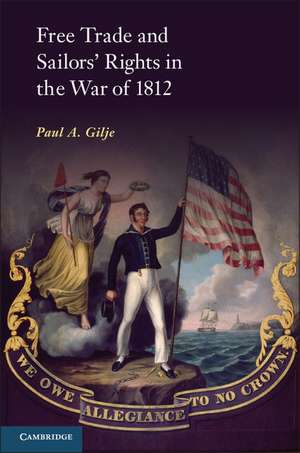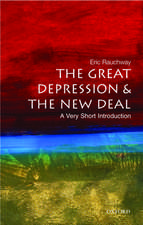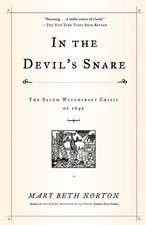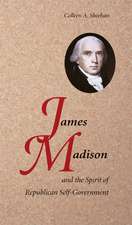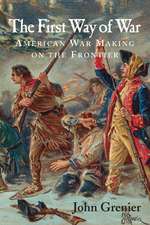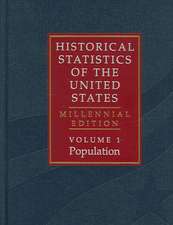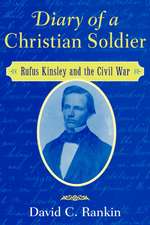Free Trade and Sailors' Rights in the War of 1812
Autor Paul A. Giljeen Limba Engleză Paperback – 17 mar 2013
| Toate formatele și edițiile | Preț | Express |
|---|---|---|
| Paperback (1) | 276.77 lei 6-8 săpt. | |
| Cambridge University Press – 17 mar 2013 | 276.77 lei 6-8 săpt. | |
| Hardback (1) | 646.12 lei 6-8 săpt. | |
| Cambridge University Press – 17 mar 2013 | 646.12 lei 6-8 săpt. |
Preț: 276.77 lei
Nou
Puncte Express: 415
Preț estimativ în valută:
52.96€ • 55.43$ • 44.08£
52.96€ • 55.43$ • 44.08£
Carte tipărită la comandă
Livrare economică 31 martie-14 aprilie
Preluare comenzi: 021 569.72.76
Specificații
ISBN-13: 9781107607828
ISBN-10: 1107607825
Pagini: 437
Ilustrații: 24 b/w illus.
Dimensiuni: 154 x 235 x 23 mm
Greutate: 0.61 kg
Ediția:New.
Editura: Cambridge University Press
Colecția Cambridge University Press
Locul publicării:New York, United States
ISBN-10: 1107607825
Pagini: 437
Ilustrații: 24 b/w illus.
Dimensiuni: 154 x 235 x 23 mm
Greutate: 0.61 kg
Ediția:New.
Editura: Cambridge University Press
Colecția Cambridge University Press
Locul publicării:New York, United States
Cuprins
Part I. Free Trade: 1. The Enlightenment and defining free trade; 2. The revolutionary experience; 3. The new diplomacy; 4. Legacy; Part II. Sailors' Rights: 5. Anglo-American traditions; 6. The rise of Jack Tar; 7. Impressment; 8. Citizenship; 9. The Hermione and the rights of man; Part III. Origins: 10. Empire of liberty; 11. Indians in the way; 12. Contested commerce; 13. The ordeal of Jack Tar; 14. Honor; Part IV. War: 15. The odyssey of the Essex; 16. The language of combat; 17. Politics of war; 18. Pursuit of peace; 19. Dartmoor; Part V. Memory: 20. Winning the peace; 21. Remembering impressment; 22. The persistent dream; 23. Politics; 24. Popular culture; 25. Conclusion.
Recenzii
'Gilje skilfully analyzes Anglo-American diplomacy over impressment and neutral rights. Unlike most other accounts of the War of 1812, he traces the roots of these issues back to the colonial period and also explains how these issues fared in the aftermath of the conflict. The major contribution to scholarship, however, is the reconstruction of the multiple meanings of 'free trade' and the explanation of the significance of impressment for early America's national identity.' Reviews in History
'Gilje's book is a valuable contribution and a substantial achievement.' Matthew Taylor Raffety, William and Mary Quarterly
'… one of the best of many books recently published to mark the bicentennial of the War of 1812.' Brian Rouleau, Register of the Kentucky Historical Society
'… I would recommend the book to anyone interested in the maritime and ideological dimensions of the war as well as anyone interested in connections between the colonial and early national periods in US history.' Christopher P. Magra, The New England Quarterly
'This work deserves a central place on bookshelves devoted to the nation's second war with Great Britain. All students interested in the origins of the War of 1812 and its aftermath will profit from it.' Donald R. Hickey, The Journal of American History
'… Gilje's ambition is admirable. He has rescued the forgotten phrase that gave meaning to America's original forgotten war.' Denver Brunsman, Journal of Interdisciplinary History
'[Gilje] poignantly shows that, to Americans in the postrevolutionary period, free trade and sailors' rights symbolized the success of the American Revolution and that they therefore interpreted their violation by Great Britain as an attack on their democratic aspirations.' Jasper M. Trautsch, Amerikastudien/American Studies
'Gilje's book is a valuable contribution and a substantial achievement.' Matthew Taylor Raffety, William and Mary Quarterly
'… one of the best of many books recently published to mark the bicentennial of the War of 1812.' Brian Rouleau, Register of the Kentucky Historical Society
'… I would recommend the book to anyone interested in the maritime and ideological dimensions of the war as well as anyone interested in connections between the colonial and early national periods in US history.' Christopher P. Magra, The New England Quarterly
'This work deserves a central place on bookshelves devoted to the nation's second war with Great Britain. All students interested in the origins of the War of 1812 and its aftermath will profit from it.' Donald R. Hickey, The Journal of American History
'… Gilje's ambition is admirable. He has rescued the forgotten phrase that gave meaning to America's original forgotten war.' Denver Brunsman, Journal of Interdisciplinary History
'[Gilje] poignantly shows that, to Americans in the postrevolutionary period, free trade and sailors' rights symbolized the success of the American Revolution and that they therefore interpreted their violation by Great Britain as an attack on their democratic aspirations.' Jasper M. Trautsch, Amerikastudien/American Studies
Notă biografică
Descriere
Examines the slogan 'free trade and sailors rights', tracing its sources to eighteenth-century thought and Americans' experience with impressment into the British navy.
